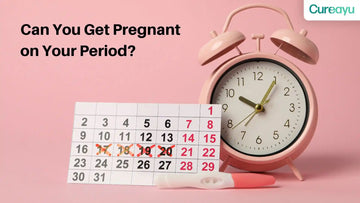Navigating the complexities of the menstrual cycle and understanding fertility nuances play a monumental role in reproductive health management and family planning endeavors. A pervasive question that often stirs confusion and curiosity alike is the real likelihood of conceiving during menstruation. The pervasive belief anchors menstruation as a built-in contraceptive phase, however, the layers of reality unfold a more complex narrative.
Also Read: How To Stop Masturbating: Effective Strategies for a Healthier Life
Debunking Menstrual Myths
Embarking on this informative journey, it becomes imperative to dismantle the fortified myths encircling menstruation and fertility. Amongst the myriad of misconceptions, the premise of engaging in unprotected sex during menstrual periods — under the false safety net against pregnancy — holds substantial ground. This narrative is not just misleading but also overlooks the biological intricacies that dictate female fertility, setting the stage for a deeper exploration into the rhythm of menstrual cycles and their impact on conception possibilities.
Understanding Your Menus
At the heart of this exploration lies a detailed understanding of the menstrual cycle, a cycle that orchestrates the readiness of the female body for possible conception. With phases transitioning from menstruation to ovulation, the cycle is a testimony to the body’s preparation for fertility. Considering that menstruation signifies the shedding of the uterine lining in the absence of fertilized egg implantation, it traditionally marks a perceived period of low fertility. However, the chances of getting pregnant while on your period are not void; they pivot significantly on individual cycle characteristics and timing nuances.
Sex During Period: Assessing the Risks
Venturing into sex during your period unveils a realm filled with considerations stretching beyond the realms of comfort and hygiene. This phase, misconstrued as a natural contraceptive period, opens up a broader discussion on fertility. With sperm capable of lingering viable within the female reproductive tract for up to five days, the calculus of conception includes evaluating the alignment of late ovulation with the lifespan of sperm, revealing that periods are not an absolute barrier against pregnancy.
Also Read: Peak Performance in Bed: How To Increase Sex Stamina For Male
Can Women Get Pregnant During Their Period?
Addressing the crux of the matter, the inquiry, can women get pregnant during their period demands a closer inspection of menstrual cycles' diversity. Shorter cycles, for instance, shorten the window between menstruation and ovulation, subtly elevating the probability of a sperms’ survival coinciding with an early ovulation. This confluence of factors underscores that menstrual periods, in certain scenarios, do not entirely eclipse the chances of conception.
Short vs. Long Menstrual Cycles: A Factor in Fertility
The variance in menstrual cycle lengths significantly delineates the fertility landscape, painting a stark contrast between shorter and longer cycles. Shorter cycles inherently reduce the gap between the menstrual phase and ovulation, potentially boosting menstrual cycle pregnancy risks. This contrast sharpens with longer cycles, where the interval between periods and ovulation widens, ostensibly diminishing the probability of period-concurrent conception.
Sperm Lifespan and Its Role in Conception
A pivotal, yet often overlooked, determinant in the equation of conception is the sperm lifespan. The resilience of sperm, capable of surviving up to five days in the female reproductive system, plays an instrumental role in fertilization dynamics. This remarkable lifespan means that intercourse towards the termination of the menstrual phase could seamlessly precede ovulation, maintaining the current of life that fertilization is plausible within this seemingly improbable timetable.
Also Read: Unlock Your Potential: How to Boost Stamina Naturally
The Ovulation Factor: A Sneak Peek into Fertility’s Prime Time
Stepping into the ring with a strong contender in the fertility conversation, ovulation embodies the zenith of female fertility within the menstrual cycle. Occurring mid-cycle, ovulation releases the ovum, readying the body for potential fertilization. This phase, adorned with heightened fertility, casts a spotlight on understanding one’s specific ovulation timeline through signs or ovulation predictor kits, aligning sexual activities with conscious awareness for or against conception.
Contraception: Navigating Fertility with Confidence
As the discourse around contraception broadens, understanding its role becomes crucial in steering through menstrual and fertility conversations. With options ranging from barrier methods to hormonal, the selection of contraception tailors to personal health profiles, beliefs, and convenience, catering to a spectrum of needs and preferences. This chapter delves deep into making informed choices, ensuring a safety net against unwanted pregnancies, even during periods deemed 'safer'.
The Myriad Faces of Menstrual Irregularities: A Consideration
In the vast tapestry of female reproductive health, menstrual irregularities emerge as noteworthy considerations. These anomalies, whether in cycle duration, flow intensity, or symptoms, might signal underlying health challenges or simply reflect the body’s natural variability. Their presence adds a layer of complexity to predicting ovulation and, subsequently, managing fertility expectations, urging a nuanced understanding and, when necessary, medical consultation.
Conclusion: A Holistic Approach to Reproductive Health
The voyage through the rich landscape of menstrual cycles, fertility, and contraception culminates in acknowledging that while the chances of getting pregnant while on your period lean towards the lower spectrum, they are invariably present. Armored with comprehensive insights into how menstrual cycles interplay with fertility and the strategies to navigate this complex terrain, individuals are better equipped to make informed decisions that align with their family planning goals and reproductive health.
The essence of this exploration transcends the mere debunking of myths; it fosters a holistic embrace of reproductive health, advocating for informed dialogue, continuous learning, and personalized healthcare engagements. As every journey through menstruation and fertility is unique, tailored advice from healthcare professionals remains paramount, ensuring that each step taken is one of informed confidence.
In unwrapping the intricate ballet of menstruation, ovulation, and conception, the narrative reiterates the power vested in knowledge and choice. The menstrual cycle, in all its complexity, offers not just a glimpse into the wonder of human biology but also a gateway to embracing reproductive health with dignity and agency. With each cycle, comes an opportunity to nurture understanding, embrace health, and navigate the intricate dance of fertility with grace and empowerment.











